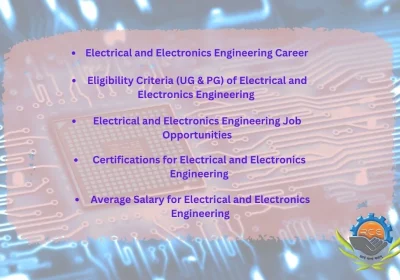
Is Electronics and Communication Engineering a good career?
Electronics and Communication Engineering can be a good career choice for individuals who are interested in designing and developing electronics and communication systems. These systems are used in a variety of industries, including telecommunications, aerospace, defense, consumer electronics, and medical equipment.
Electronics and Communication Engineers work on the development, design, and testing of electronic equipment, including computers, telecommunications systems, and consumer electronics. They may also be involved in the design of systems that use electronic signals to transmit information, such as satellite systems, cell phone networks, and fiber optic networks.
If you enjoy math, science, and problem-solving, and have an interest in electronics and communication systems, then a career in Electronics and Communication Engineering could be a good fit for you. It can be a challenging and rewarding field with opportunities for advancement and continuing education.
What is electronics and communication engineering?
Electronics and Communication Engineering is a field of engineering that focuses on the design and development of electronic systems and communication technologies. These systems and technologies are used in a wide range of applications, including telecommunications, computer networks, satellite systems, and consumer electronics.
Electronics and Communication Engineers work on the development, design, and testing of electronic equipment, including computers, telecommunications systems, and consumer electronics. They may also be involved in the design of systems that use electronic signals to transmit information, such as satellite systems, cell phone networks, and fiber optic networks.
In addition to technical skills, Electronics and Communication Engineers also need strong problem-solving and analytical skills, as well as the ability to work well in teams. They may work in a variety of settings, including research and development laboratories, manufacturing plants, and consulting firms.
Electronics and Communication Engineering Scope
The scope of Electronics and Communication Engineering is broad and includes a wide range of applications and technologies. Some of the areas where Electronics and Communication Engineers may work include:
1. Telecommunications: designing and developing telecommunications systems, such as cell phone networks, satellite systems, and fiber optic networks
2. Computer networks: designing and developing computer networks, including local area networks (LANs), wide area networks (WANs), and the internet
3. Consumer electronics: designing and developing electronic equipment for consumer use, such as smartphones, tablets, and home appliances
4. Aerospace and defense: designing and developing electronics systems for use in the aerospace and defense industries, including radar systems and satellite communication systems
5. Medical equipment: designing and developing electronic medical equipment, such as ultrasound machines and diagnostic equipment
6. Industrial control systems: designing and developing electronic systems for use in industrial settings, such as control systems for manufacturing processes and power plants
Electronics and Communication Engineers may work in a variety of settings, including research and development laboratories, manufacturing plants, and consulting firms. They may also work in government agencies or academic institutions, conducting research and teaching.
Electronics and Communication Engineering Salary
The salary for an electronics and communication engineer can vary significantly depending on a number of factors, including:
• The level of education and experience of the engineer
• The location and size of the company or organization they work for
• The specific industry in which they work (e.g., telecommunications, defense, automotive, etc.)
In general, electronics and communication engineers with a bachelor’s degree and several years of experience can expect to earn a median salary of around 4 lakh per year. Those with a master’s degree or higher and more advanced experience may earn significantly more.
It’s worth noting that these figures are just estimates and should be used as a general guide. Actual salaries can vary widely depending on the individual circumstances of each engineer.
Electronics and Communication Engineering Placements
Electronics and communication engineering graduates can find employment in a wide range of industries, including telecommunications, consumer electronics, defense, automotive, healthcare, and many others. Some of the top companies that hire electronics and communication engineers include:
• Intel
• Qualcomm
• Cisco Systems
• Ericsson
• Nokia
• Samsung
• LG
• Huawei
• Apple
• IBM
Electronics and communication engineers can also find employment with smaller companies, startups, and research organizations. Many electronics and communication engineers also go on to work as consultants, providing expertise and guidance to companies in need of their services.
Here are a few more options for industries and companies that hire electronics and communication engineers:
• Aerospace and defense: Boeing, Lockheed Martin, Raytheon
• Automotive: General Motors, Ford, Toyota
• Energy: ExxonMobil, Chevron, BP
• Financial services: JPMorgan Chase, Goldman Sachs, Citigroup
• Government agencies: National Aeronautics and Space Administration (NASA), National Security Agency (NSA), Central Intelligence Agency (CIA)
• Healthcare: Johnson & Johnson, Pfizer, Merck
• Telecommunications: AT&T, Verizon, T-Mobile
This is just a small sample of the many industries and companies that hire electronics and communication engineers. With the widespread use of electronic devices and systems in almost all aspects of modern life, there are many opportunities for electronics and communication engineers to use their skills and knowledge in a variety of fields.
Electronics and Communication Engineering Syllabus
The syllabus for an electronics and communication engineering program can vary depending on the specific school and program, but most programs will cover a core set of topics that include:
1. Circuit theory and analysis: This includes topics such as Ohm’s law, Kirchhoff’s laws, and circuit analysis techniques.
2. Electronics: This includes topics such as semiconductor devices, amplifiers, and digital electronics.
3. Communications: This includes topics such as analog and digital communication systems, modulation and demodulation, and information theory.
4. Control systems: This includes topics such as control system design, stability analysis, and feedback control.
5. Signals and systems: This includes topics such as continuous and discrete time signals, Fourier analysis, and Laplace transforms.
6. Computer architecture and organization: This includes topics such as computer organization, operating systems, and computer networks.
7. Electromagnetics: This includes topics such as static and dynamic electromagnetism, transmission lines, and wave propagation.
8. Microelectromechanical systems (MEMS): This includes topics such as microfabrication techniques, sensors and actuators, and microelectromechanical systems design.
This is just a sample of the topics that may be covered in an electronics and communication engineering program. The specific syllabus will vary depending on the school and program.
Here are a few more topics that may be covered in an electronics and communication engineering program:
1. VLSI design: This includes topics such as CMOS logic design, design automation tools, and VLSI testing and verification.
2. Antenna design: This includes topics such as antenna theory, antenna design and simulation tools, and practical antenna design techniques.
3. Wireless communication: This includes topics such as wireless systems, propagation and fading, and wireless networking protocols.
4. Optical communication: This includes topics such as fiber optic systems, wavelength division multiplexing, and optoelectronic devices.
5. Data communication: This includes topics such as data transmission, networking protocols, and data security.
6. Embedded systems: This includes topics such as microcontroller architecture, real-time operating systems, and embedded system design and development.
7. Power electronics: This includes topics such as power semiconductor devices, AC-DC converters, and DC-DC converters.
Again, the specific topics covered in an electronics and communication engineering program can vary depending on the school and program. These are just a few examples of the types of topics that may be covered.
Frequently Asked Questions
Q1. Is Electronics and Communication Engineering in demand?
Ans. Electronics and communication engineering is a field that is in high demand, especially in today’s technology-driven world. There is a constant need for skilled professionals in this field to design, develop, and maintain a wide range of electronic and communication systems.
These systems are used in a variety of industries, including telecommunications, healthcare, transportation, and manufacturing, among others. Demand for electronics and communication engineers is expected to continue to grow as the field evolves and new technologies emerge.
Some additional points to consider about the demand for electronics and communication engineering:
- The field is diverse and covers a wide range of technologies and applications, which means that there are many opportunities for professionals with this background to specialize in areas such as telecommunications, networking, internet of things (IoT), and more.
- The demand for skilled professionals in the field is not limited to one specific region or country. Electronics and communication engineering is a global field, and there are opportunities for professionals in this field all around the world.
- Many companies and organizations rely on electronics and communication systems to function, so there is a constant need for professionals who can design, develop, and maintain these systems.
- As technology continues to advance, the demand for electronics and communication engineers is likely to increase, as new technologies and systems are developed and implemented.
Overall, electronics and communication engineering is a field that is in high demand and offers a wide range of career opportunities for skilled professionals.
Q2. Does ECE have high salary?
Ans. The salary for electronics and communication engineering (ECE) professionals can vary widely depending on a number of factors, including the individual’s level of education and experience, the specific industry they work in, and the location of their job. In general, however, ECE professionals tend to earn higher salaries compared to professionals in other fields, due to the high demand for their skills and the specialized nature of their work.
According to data from the U.S. Bureau of Labor Statistics (BLS), the median annual wage for electrical and electronics engineers (which includes ECE professionals) was $98,530 in May 2020. The lowest 10% earned less than $58,580, while the highest 10% earned more than $144,520.
Salaries for ECE professionals can also vary depending on the specific industry they work in. For example, electrical and electronics engineers working in the manufacturing industry tend to earn higher salaries compared to those working in the government or education sectors.
In addition to salary, ECE professionals may also be eligible for a range of benefits, including healthcare, retirement plans, and paid time off, which can add to their overall compensation.
Q3. Does ECE have scope in future?
Ans. Electronics and communication engineering (ECE) is a field that is constantly evolving, and there is a strong demand for skilled professionals in this field. The increasing reliance on technology in our daily lives means that there will likely be a continued need for ECE professionals to design, develop, and maintain a wide range of electronic and communication systems.
Some specific areas where ECE professionals may have particularly good job prospects in the future include:
- Internet of Things (IoT): The IoT refers to the growing network of interconnected devices that are able to collect and exchange data. ECE professionals with expertise in IoT technologies will be in high demand as more and more devices become connected.
- 5G: The rollout of 5G networks is expected to drive demand for ECE professionals with expertise in telecommunications and networking.
- Artificial intelligence and machine learning: The development and implementation of AI and machine learning technologies will likely require the expertise of ECE professionals.
Overall, there is a strong outlook for ECE professionals in the future, and the demand for skilled professionals in this field is expected to continue to grow.
Q4. Is ECE better or CSE better?
Ans. It’s difficult to say definitively whether one field is “better” than the other, as it really depends on your interests and career goals. Both Electrical and Computer Engineering (ECE) and Computer Science and Engineering (CSE) are rewarding and in-demand fields that offer a wide range of career opportunities.
ECE focuses on the design and development of electrical and electronic systems, such as computers, telecommunications systems, and power generation and distribution systems. CSE, on the other hand, focuses on the design and development of computer systems and software.
Both fields require strong analytical, problem-solving, and technical skills, and they are both highly interdisciplinary, meaning that they draw from a range of other fields such as mathematics, physics, and materials science.
Ultimately, the decision of whether to study ECE or CSE will depend on your interests and career goals. If you are interested in electrical and electronic systems, and want to focus on the hardware side of computing, then ECE might be a good fit for you. If you are more interested in software development and computer systems, then CSE might be a better choice.
Q5. What is starting salary of Electronics Engineer in India?
Ans. It is difficult to give an exact starting salary for electronics engineers in India, as it can vary widely based on a number of factors such as the specific job, the company, the location, the individual’s education and experience, and the demand for electronics engineering professionals in that region.
According to data from Glassdoor, the average starting salary for electronics engineers in India is around INR 4,00,000 per year. However, this number can vary significantly depending on the specific job and company, with some electronics engineering positions paying significantly more or less than this average.
It’s also worth noting that starting salaries tend to be lower for entry-level positions and higher for more experienced professionals. So, as an electronics engineer gains more experience and skills, their salary is likely to increase.
Q6. Does ECE have scope in abroad?
Ans. Electrical and Computer Engineering (ECE) is a highly in-demand field that is relevant globally, so there is certainly scope for ECE professionals to work abroad. Many ECE graduates go on to pursue careers in a variety of industries, including telecommunications, computer hardware and software, power and energy systems, transportation, and manufacturing, among others. These industries are present in many countries around the world, so there are often opportunities for ECE professionals to work abroad.
In addition to industry jobs, there are also many academic and research opportunities available to ECE professionals in countries around the world. Many universities and research institutions have active ECE departments and hire researchers and professors to work in a variety of areas within the field.
Overall, there are many opportunities for ECE professionals to work abroad, depending on their interests and career goals.
I hope you learn some new from this post if you have any other query please comment below. We will reply you soon.






